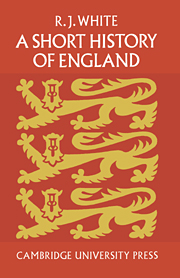Book contents
- Frontmatter
- Preface
- Contents
- Introduction: On the Character of English History
- 1 Roman Britain
- 2 Saxon England
- 3 The Anglo-Norman State
- 4 Common Law and Charter
- 5 The High Middle Ages
- 6 The Nation-State
- 7 The first Elizabethan Age
- 8 The Civil War
- 9 The Withdrawing Roar
- 10 The Century of Success
- 11 The first British Empire
- 12 The Age of Everything
- 13 War and Peace
- 14 Victorian Ages
- 15 Imperial and Edwardian
- Postscript
- Further Reading
- Index
- Frontmatter
- Preface
- Contents
- Introduction: On the Character of English History
- 1 Roman Britain
- 2 Saxon England
- 3 The Anglo-Norman State
- 4 Common Law and Charter
- 5 The High Middle Ages
- 6 The Nation-State
- 7 The first Elizabethan Age
- 8 The Civil War
- 9 The Withdrawing Roar
- 10 The Century of Success
- 11 The first British Empire
- 12 The Age of Everything
- 13 War and Peace
- 14 Victorian Ages
- 15 Imperial and Edwardian
- Postscript
- Further Reading
- Index
Summary
Large social changes had been brought about by the early 1920s: the equalization of the status of women, the democratization of the suffrage by the Franchise Act of 1928 (the ‘Flapper Vote’), the ubiquity of the state in all spheres of the citizen's life, the replacement of the Liberal by the Labour Party as the self-accredited party of progress. In 1926 a miners' strike culminated in a General Strike, and four years later the Great Depression led to the financial crisis which turned the second Labour Government into the National Government of 1931, and the Tweedledum and Tweedledee partnership of Ramsay MacDonald and Stanley Baldwin which presided over Great Britain in the peculiarly unheroic years remembered as ‘the Baldwin era’. While MacDonald basked in the smiles of duchesses and kept his broad back turned to the venom of his ‘betrayed’ party, Baldwin smoked his pipe and earned the sobriquet of ‘Old Sealed-Lips’ concerning the rearmament of the country in face of the mounting threat of the dictators. These were, indeed, the ‘Years of the Locust’ when the country was bedevilled by the antics of the Peace Pledge Union, and of the Oxford Union and its notorious motion not to fight for King and Country. Meanwhile Churchill was a voice crying in the wilderness, and the Labour Party was led by George Lansbury, a Christian Pacifist in his middle seventies who appears to have believed that the peace of the world could best be saved if only he could ‘go and have a heart-to-heart talk with Hitler’.
- Type
- Chapter
- Information
- A Short History of England , pp. 281 - 283Publisher: Cambridge University PressPrint publication year: 1967



